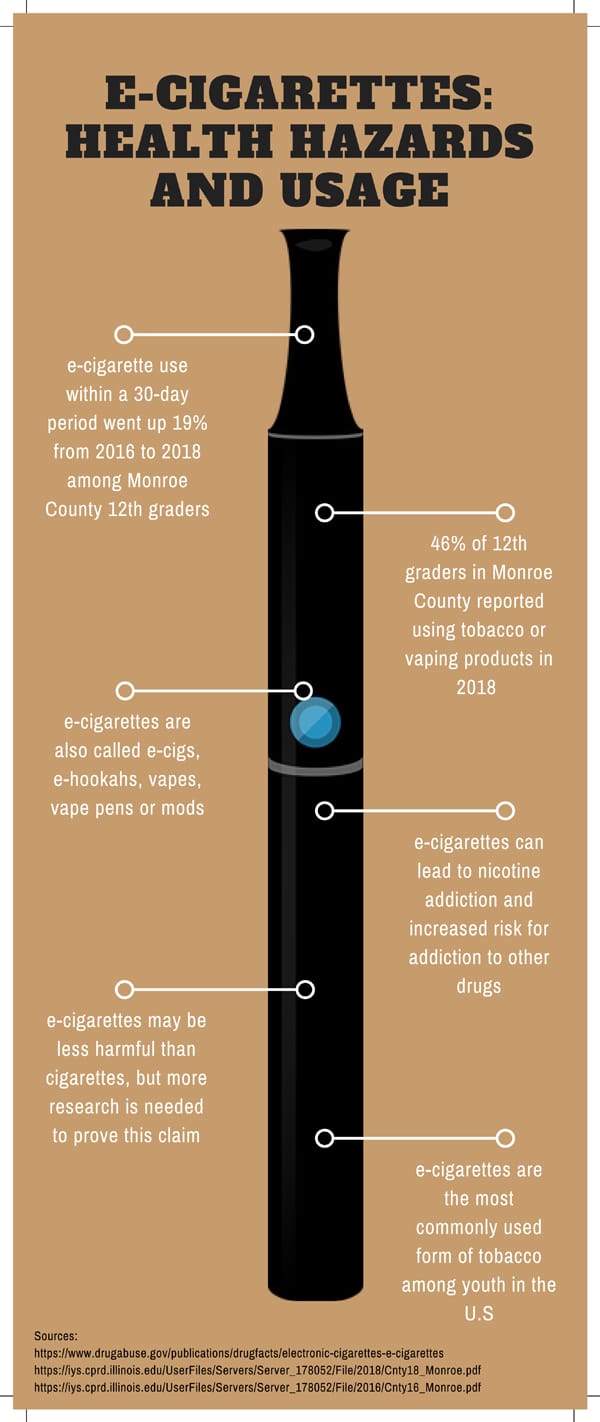Rising trend of e-cig use causes concern

Local school leaders and health officials say the use of e-cigarettes is trending up with increasing cause for concern.
In the largest coordinated enforcement effort in FDA history, the agency issued more than 1,300 warning letters and fines to retailers who illegally sold e-cigarette products to minors during a nationwide, undercover blitz of physical and online stores this summer.
“We see clear signs that youth use of electronic cigarettes has reached an epidemic proportion, and we must adjust certain aspects of our comprehensive strategy to stem this clear and present danger,” FDA Commissioner Scott Gottlieb said. “This starts with the actions we’re taking today to crack down on retail sales of e-cigarettes to minors.”
An e-cigarette is a handheld electronic device that simulates the feeling of smoking tobacco. It works by heating a liquid to generate an aerosol, commonly called a “vapor,” that the user inhales.
The vast majority of the violations were for the illegal sale of five e-cigarette products – Vuse, Blu, JUUL, MarkTen XL and Logic. The FDA reported these five brands comprise more than 97 percent of the U.S. market for e-cigarettes.
In addition to the letters and fines, the FDA is asking each of these five companies to submit plans detailing how they will address the widespread youth access to and use of their products.
Companies have 60 days to submit these plans. If they do not do so to the FDA’s satisfaction, it will review the current policy that results in these products remaining on the market without a marketing order.
Monroe County stakeholders primarily lauded the action.
“Anytime they can have any type of action that can help curb e-cigarettes, regulate them or that’s going to protect the unsuspecting from them, that’s what we need to applaud,” Monroe County Coalition for Drug-Free Communities chairperson Gary Most said. “You hope that it can curb that with some of the youth and it’s not something that is just too far down the tracks already.”
According to the 2018 Illinois Youth Survey, 48 percent of 12th graders in Monroe County reported using e-cigarettes within a 30-day period. That number was 24 percent and 10 percent for 10th and eighth graders, respectively.
Columbia school district Superintendent Gina Segobiano said her district sees prevalent e-cigarette use among its students.
“Columbia Middle School and Columbia High School have experienced a spike in out-of-school suspensions for tobacco/e-cigarette violations,” she said. “Obtaining an e-cigarette does not appear to be difficult among teens and the flavored e-liquid is promoted as acceptable (to) use (and) that attracts minors.”
Waterloo school district Superintendent Brian Charron said e-cigarette use among junior high and high school students is significant in his district, too, and has increased in recent years.
“We are concerned about how widespread the use seems to be among students,” Charron said. “We are worried about the long-term health impact on them. We fear that parents don’t realize what their children have. We’ve also come across numerous situations where parents are complicit with their children using it.”
Segobiano said students caught using any tobacco products in her district receive an out-of-school suspension.
In Charron’s district, a first offense gets an in-school suspension. Repeat offenders are punished with an out-of-school suspension.
This punishment might help curtail the use of these products, which The National Institute on Drug Abuse reports can alter the reward center in the brain, cause nicotine addiction and make other, stronger drugs more pleasurable to teenagers.
E-cigarettes, often called e-cigs, also contain carcinogens and chemicals that can cause respiratory problems.
Monroe County Health Department Administrator John Wagner said that is his department’s issue with the products.
“The use of e-cigs is not a safe alternative to tobacco use,” he said. “One of the biggest concerns the health department has is the use of other substances being introduced into the e-cigs. The health department feels e-cigs should be regulated the same as tobacco products.”
Going forward, Most said he does not yet know how the FDA’s action will impact these harmful products.
“We would hope that it’s going to reflect positively within the community, but I think it’s a little too early to tell at this point,” Most said.
Similarly, Segobiano characterized the FDA’s action as a step in the right direction.
“FDA involvement by sending out warning letters and fines to retailers is a great start for enforcing illegal sales to minors,” she said. “E-cigarettes are definitely a fad among high school and college students.”
Charron, however, was more skeptical about the FDA’s actions.
“My personal feeling is it’s too little too late to have an impact,” he said. “It’s been going on for years. I do believe it’s becoming an epidemic amongst our kids. (The FDA’s action) might improve conditions in the future, but it’s not going to affect the problem that we have with today’s youth.”
“The school can’t fix this problem,” he added. “This problem is coming from home. We need parents to be educated and informed about what’s going on.”






